Overview
Caring approaches to integrating clinic AI recognize the emotional challenges faced by healthcare providers. Strategies that prioritize compassionate care not only enhance operational efficiency but also address clinician burnout. Have you ever felt overwhelmed by administrative tasks? The burden can significantly impact patient care and provider well-being.
This article outlines proven methods that foster a supportive environment for both healthcare providers and patients. By engaging stakeholders, implementing pilot programs, and offering ongoing training, we can improve patient interactions and alleviate administrative burdens. These solutions are not just about efficiency; they are about nurturing the relationships that matter most in healthcare.
Imagine a clinic where healthcare providers feel supported and patients receive the compassionate care they deserve. These approaches ultimately create a healthier workplace, enhancing the overall experience for everyone involved. Let’s explore how we can work together to implement these caring strategies and make a meaningful difference in our healthcare environments.
Introduction
The integration of Artificial Intelligence (AI) into healthcare represents more than just a technological advancement; it embodies a significant shift in how we deliver and manage patient care. Healthcare providers often face emotional challenges as they navigate the complexities of modern medical demands. In this context, AI emerges as a powerful ally, not only automating routine tasks but also enhancing diagnostic accuracy and personalizing patient interactions.
As we explore the multifaceted role of AI in reshaping healthcare, it's crucial to recognize how it can alleviate administrative burdens that weigh heavily on providers. Imagine a world where healthcare professionals can focus more on their patients, leading to improved outcomes and a more compassionate approach to care. By examining proven strategies for successful AI integration, we can highlight the benefits it brings to both providers and patients alike.
The urgency for healthcare organizations to embrace these innovations cannot be overstated. As the healthcare landscape evolves, understanding the implications of AI will be vital for providers aiming to enhance operational efficiency while maintaining their commitment to compassionate care. Let us reflect on how these advancements can support our shared mission of delivering quality patient care, ensuring that we remain aligned with our ethical and faith-based values.
Understanding the Role of AI in Modern Healthcare
Clinic AI is fundamentally transforming the medical field, offering to addressing the emotional challenges faced by healthcare providers. By automating routine tasks, enhancing diagnostic accuracy, and enabling tailored care for individuals, AI technologies such as machine learning and natural language processing empower healthcare providers to swiftly analyze extensive datasets. This results in improved decision-making and operational efficiency, allowing clinicians to focus more on their patients.
Imagine a world where AI algorithms can analyze large datasets to identify genetic markers and biomarkers associated with specific diseases or treatment responses. This capability not only assists in diagnosing illnesses through the analysis of medical images but also predicts outcomes based on historical data, significantly enhancing the overall quality of care.
This integration simplifies workflows, enabling clinicians to dedicate more time to meaningful interactions with their patients. Recent statistics indicate that 50% of healthcare professionals in the EU express confidence that AI will enhance treatment quality for individuals. This growing recognition of AI's potential is especially significant for faith-oriented providers, as AI can support ethical medical practices while enhancing treatment.
Moreover, a study reveals that 9% of psychiatrists believe AI could offer compassionate assistance, demonstrating its ability to enrich the emotional aspects of interactions with individuals. also play a crucial role in telehealth services, providing real-time data analysis and monitoring, particularly beneficial in primary health settings.
As medical systems face increasing pressures and rising rates of clinician burnout, the implementation of Clinic AI for automating administrative tasks emerges as a vital solution. Case studies show that by alleviating these burdens, AI can significantly lower stress levels among medical professionals, allowing them to concentrate more on client support and enhancing service quality. This is especially important for faith-oriented practices, where compassionate support aligns with the mission of organizations like CosmaNeura.
Mike Thorpe, a Senior Solutions Consultant at CosmaNeura, emphasizes, "Orchestration is the invisible conductor of medical AI, harmonizing complex workflows, integrating disparate systems, and ensuring that generative AI technologies work in concert to deliver seamless, intelligent care." By understanding the complex function of AI, medical professionals can better recognize its transformative potential, leading to increased engagement and improved health outcomes.
As the integration of AI technologies continues to evolve, it is essential for suppliers to stay informed about advancements and successful implementations in the field. This knowledge is crucial in overcoming the resistance to innovation that many medical startups face. Together, let us embrace these changes and foster a compassionate environment that prioritizes patient care.
Challenges Faced by Healthcare Providers in the Digital Age
In 2025, medical practitioners are navigating a landscape filled with significant challenges. They face administrative overload, data management complexities, and an urgent need for improved client engagement. The intricate web of healthcare regulations, coupled with the relentless demand for high-quality treatment, has greatly contributed to clinician burnout. Administrative tasks—such as scheduling, billing, and documentation—consume valuable hours that could otherwise be spent connecting with patients.
The introduction of electronic health records (EHRs) has added to these complexities, resulting in data silos that hinder providers from accessing complete information about individuals. This fragmentation not only obstructs effective decision-making but also diminishes the overall quality of care delivered. The World Health Organization warns of an impending global shortage of health workers, including administrative staff, underscoring the urgent need to address these burdens to prevent further workforce attrition.
present a promising solution to these pressing challenges. By automating routine tasks, offering actionable insights from individual data, and enhancing communication among medical teams, they can significantly alleviate the strain on healthcare providers. However, it’s important to recognize that many medical practitioners, particularly physicians, may initially resist these innovations due to concerns about maintaining service standards and client interactions. Addressing these worries is crucial for the successful integration of clinic AI.
For instance, recent assessments indicate that nurses found clinic AI-driven summary models to be 90 percent beneficial. This demonstrates the potential of clinic AI to simplify workflows and reduce administrative burdens while ensuring that patient support remains a priority.
As medical systems face mounting pressures, including costly administrative practices from insurers that threaten access to services, the adoption of clinic AI can provide immediate relief and foster long-term operational efficiencies. More than 70% of C-suite executives across five countries have expressed that enhancing operational efficiencies and productivity will be key priorities for their organizations this year. This further highlights the necessity for effective solutions. Ultimately, addressing administrative overload through clinic AI can boost loyalty and service utilization, enabling practitioners to concentrate on delivering exceptional care while navigating the inherent resistance to innovation within the sector.
Aligning AI Integration with Ethical and Faith-Based Values
Integrating clinic AI into medical practices requires a thoughtful approach that prioritizes ethical and faith-based values. For practitioners dedicated to faith-oriented support, it is essential that clinic AI solutions align with their commitment to empathetic interactions and the intrinsic dignity of every person. This alignment necessitates the development of AI algorithms that are not only transparent and unbiased but also designed to augment the human touch in care rather than replace it.
At CosmaNeura, we understand the complexities and time constraints faced by healthcare providers. Our mission is to empower physicians by alleviating their burdens, allowing them to focus on what truly matters—caring for those they serve. By embedding our commitment to quality and ethical standards into CosmaNeura's AI solutions, we ensure that these technologies enhance operational efficiency while maintaining the compassionate spirit of healthcare.
Healthcare organizations must establish comprehensive guidelines governing the ethical use of AI. These guidelines should encompass critical aspects such as consent, data privacy, and the elimination of bias in AI algorithms. By incorporating these principles into their operational structures, organizations can foster trust among individuals, ensuring that AI serves as a promoter of improved services rather than a detractor from ethical standards.
The importance of faith-based values in the integration of clinic AI is highlighted by the increasing acknowledgment of AI's potential in medical services. For instance, a recent study revealed that 82% of doctors in surgical specialties anticipate AI will influence employment rates within the sector. This statistic emphasizes the urgency for medical professionals to navigate the evolving landscape of clinic AI while focusing on ethical implications and compassionate care.
Moreover, case studies such as the role of AI in optimizing Moderna's COVID-19 vaccine development illustrate the technology's capacity to address pressing public health challenges while adhering to ethical considerations. The successful implementation of clinic AI in this context reinforces the necessity for medical professionals to embrace AI solutions that align with their core values, ultimately enhancing patient care and upholding the dignity of human life.
As the medical chatbots market is projected to grow significantly, reaching an estimated $345.3 million by 2026, the integration of AI in medicine is not merely a trend but a transformative shift. emphasize the importance of maintaining human dignity in the face of technological advancement, advocating for clinic AI that complements rather than compromises the compassionate spirit of healthcare. By prioritizing ethical AI integration, providers can ensure that their practices remain rooted in the values that define their mission.
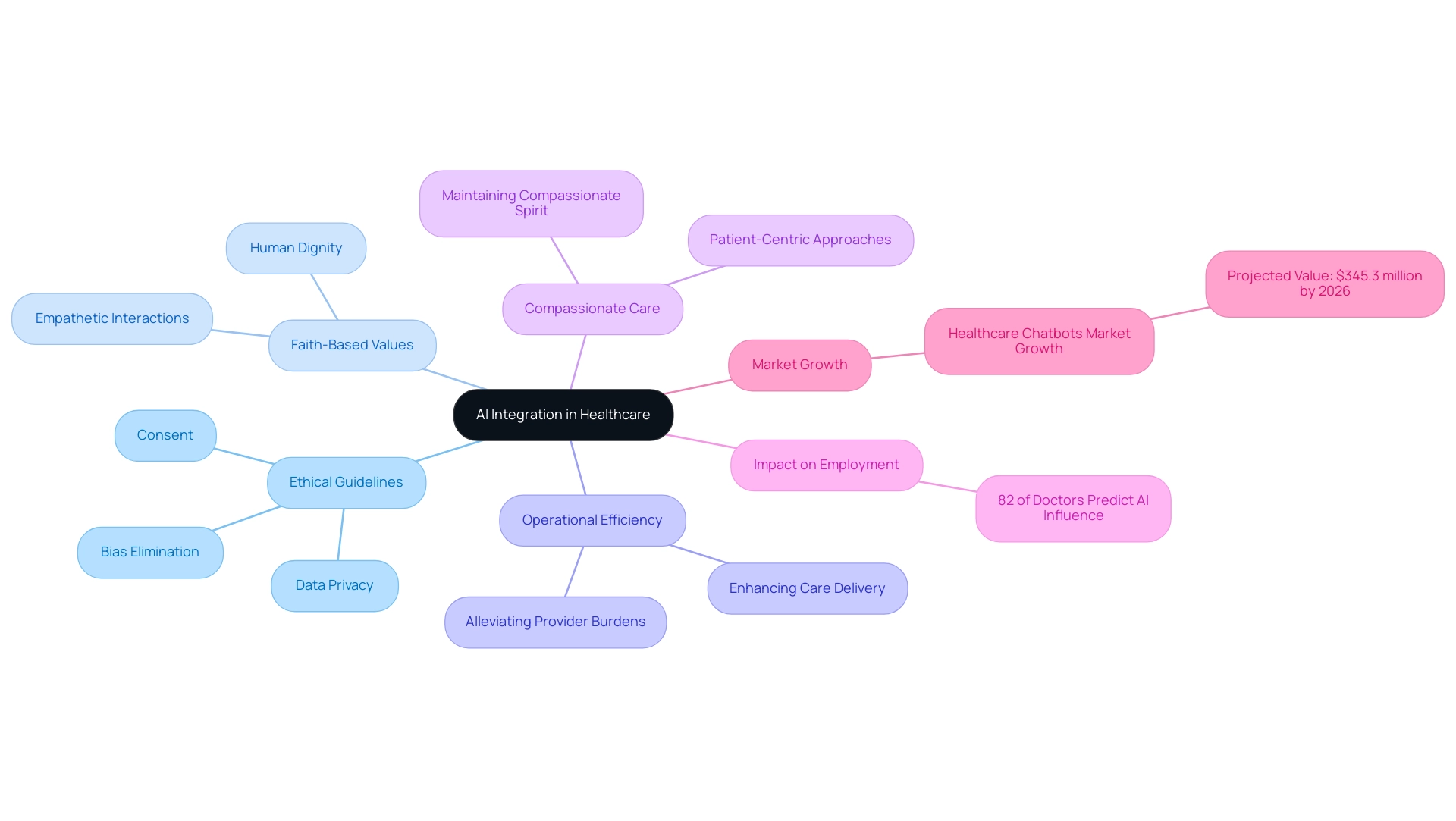
Proven Strategies for Successful AI Integration in Clinics
Successful integration of clinic AI requires a thoughtful strategy that addresses the emotional and operational challenges faced by healthcare providers.
- Assess Needs and Objectives: Start by identifying specific struggles within the clinic that AI can help alleviate, such as streamlining administrative tasks or enhancing diagnostic support. This focused approach ensures that the technology aligns with the clinic's operational goals, particularly in addressing fragmentation of care and administrative burdens that contribute to physician burnout.
- Engage Stakeholders: It’s essential to actively involve clinicians, administrative staff, and individuals in the planning phase. This engagement fosters trust and acceptance of new technology, ensuring that AI solutions cater to the diverse needs of all stakeholders. As Amani Undru highlights, 65% of organizations are either using or exploring clinic AI technologies in data and analytics, emphasizing the urgency of involving stakeholders in this journey.
- Pilot Programs: Consider implementing small-scale pilot programs to assess AI tools in real-world clinical settings. These trials offer valuable insights and allow adjustments based on user feedback, ensuring that the final implementation of the clinic AI system is effective and user-friendly. For instance, a recent study showed that 69 medical professionals assisted 50,000 mothers in Sub-Saharan Africa, showcasing AI's transformative potential in addressing health challenges and improving access to care.
- Training and Support: Providing comprehensive training sessions for staff is vital to familiarize them with AI tools and their benefits. This support builds confidence among users and maximizes the potential of clinic AI in enhancing clinical workflows. It's crucial to address healthcare providers' concerns regarding the impact of clinic AI on interactions with individuals to overcome resistance to innovation.
- Monitor and Evaluate: Establishing a continuous assessment framework is essential to evaluate the impact of AI on clinical workflows and patient outcomes. Consistent oversight allows for prompt modifications, enhancing the effectiveness of clinic AI solutions and ensuring they positively impact healthcare. The analysis of data excess and fragmentation in medical settings illustrates the challenges clinics face, with approximately 30% of the globe's data produced by the sector, making effective AI solutions indispensable.
By embracing these strategies, medical professionals can successfully integrate clinic AI into their practices, leading to significant improvements in operational efficiency and enhanced patient support. Furthermore, the Phased AI Adoption Roadmap advocates for a , emphasizing that thoughtful integration can unlock AI's potential to create equitable medical systems. Cosmonaut's commitment to faith-based medical services ensures that these strategies are not only effective but also aligned with Catholic teachings, reinforcing ethical medical practices while delivering exceptional value to care providers.
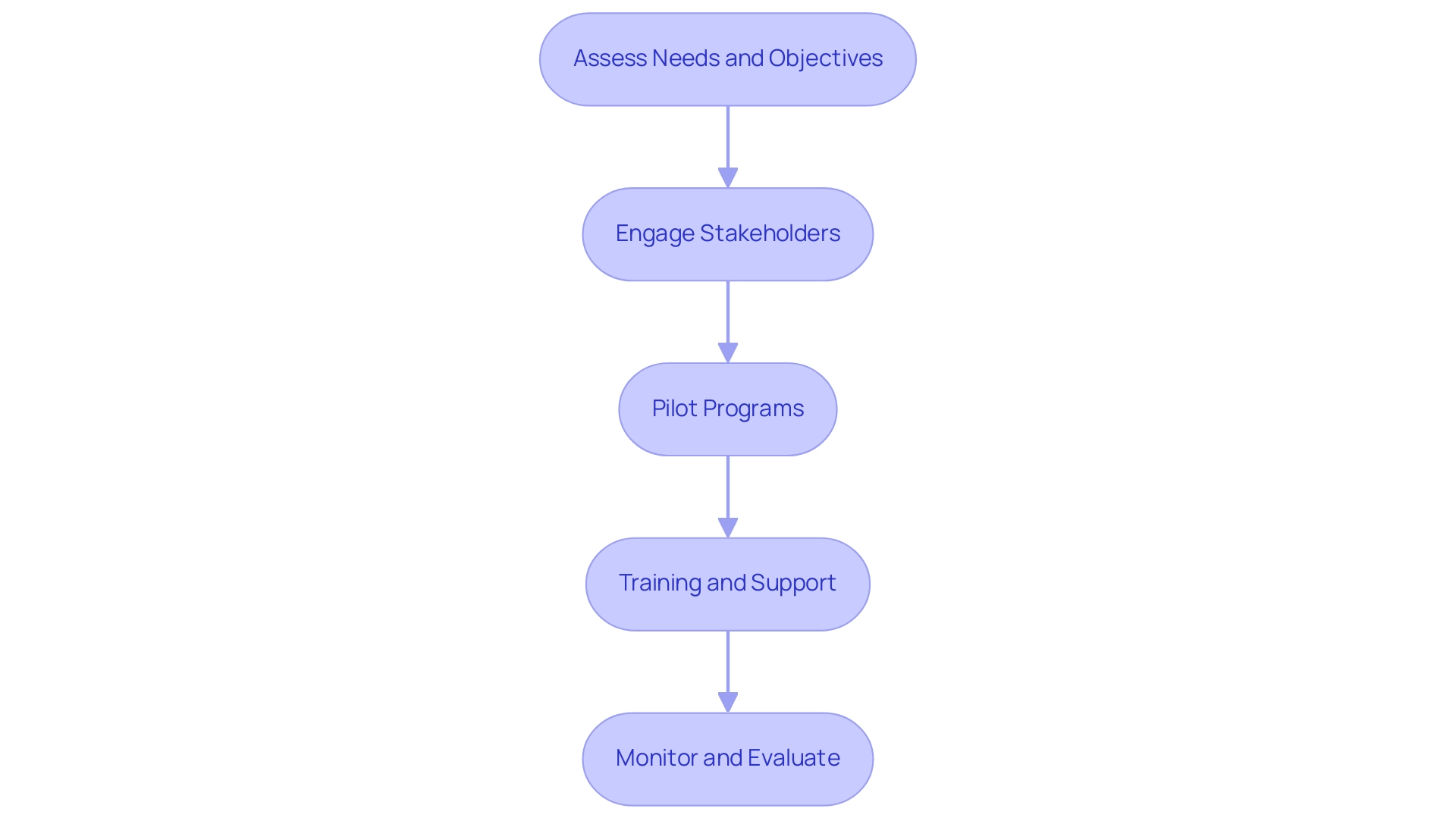
Empowering Healthcare Providers Through Training and Support
To truly harness the advantages of AI integration, medical organizations must prioritize comprehensive training and robust support systems for their staff. This nurturing approach encompasses several key components:
- Comprehensive Training Programs: Organizations should develop detailed training modules that not only cover the functionalities of AI tools but also explore their applications in clinical settings and best practices for enhancing patient engagement. Such programs are essential for ensuring that healthcare providers are well-equipped to utilize AI effectively. Considering that 43% of Americans favor human interaction and touch, it is vital that training also highlights preserving the human aspect in healthcare while employing AI technologies. The integration of AI can enhance the accuracy and efficiency of medical procedures, ultimately improving patient outcomes and experiences. Furthermore, tackling the fragmentation of medical systems through AI can result in more coordinated support, minimizing the risks linked to disjointed communication among providers.
- Ongoing Support: Establishing a continuous support system is crucial. This allows staff to seek assistance and share experiences related to AI usage, fostering a culture of continuous learning and adaptation. Research indicates that 59% of medical leaders implementing generative AI are already collaborating with third-party vendors to create tailored solutions, highlighting the importance of external support in this endeavor. This trend underscores the necessity for organizations to invest in partnerships that enhance their AI capabilities, bridging gaps in care and improving access to services, particularly for underserved populations.
- Feedback Mechanisms: Implementing structured channels for staff to provide feedback on AI tools is vital. This enables ongoing enhancements influenced by user experiences, ensuring that the tools develop to meet the requirements of medical professionals. A significant 86% of Americans express concerns about transparency in AI-generated information, underscoring the necessity for clear communication and responsiveness to staff input. Additionally, insights from the case study titled "Barriers to AI in Healthcare" reveal that skepticism regarding AI technologies often stems from concerns about misdiagnosis and the need for human oversight, further emphasizing the importance of transparency and trust in AI applications.
By empowering medical providers with the necessary training and ongoing support, organizations can significantly enhance the effectiveness of AI tools. This strategic focus not only maximizes the potential of AI in enhancing patient care but also addresses the skepticism surrounding AI technologies, paving the way for . Moreover, as indicated in a recent survey by Wolters Kluwer, 68% of physicians have altered their perspectives over the past year and are now more inclined to believe that GenAI would be advantageous to the medical field, demonstrating a rising enthusiasm for AI solutions.
As a pioneering company in AI solutions for the faith-focused medical sector, CosmaNeura is uniquely positioned to lead this transformation, ensuring that ethical considerations remain at the forefront of AI integration.
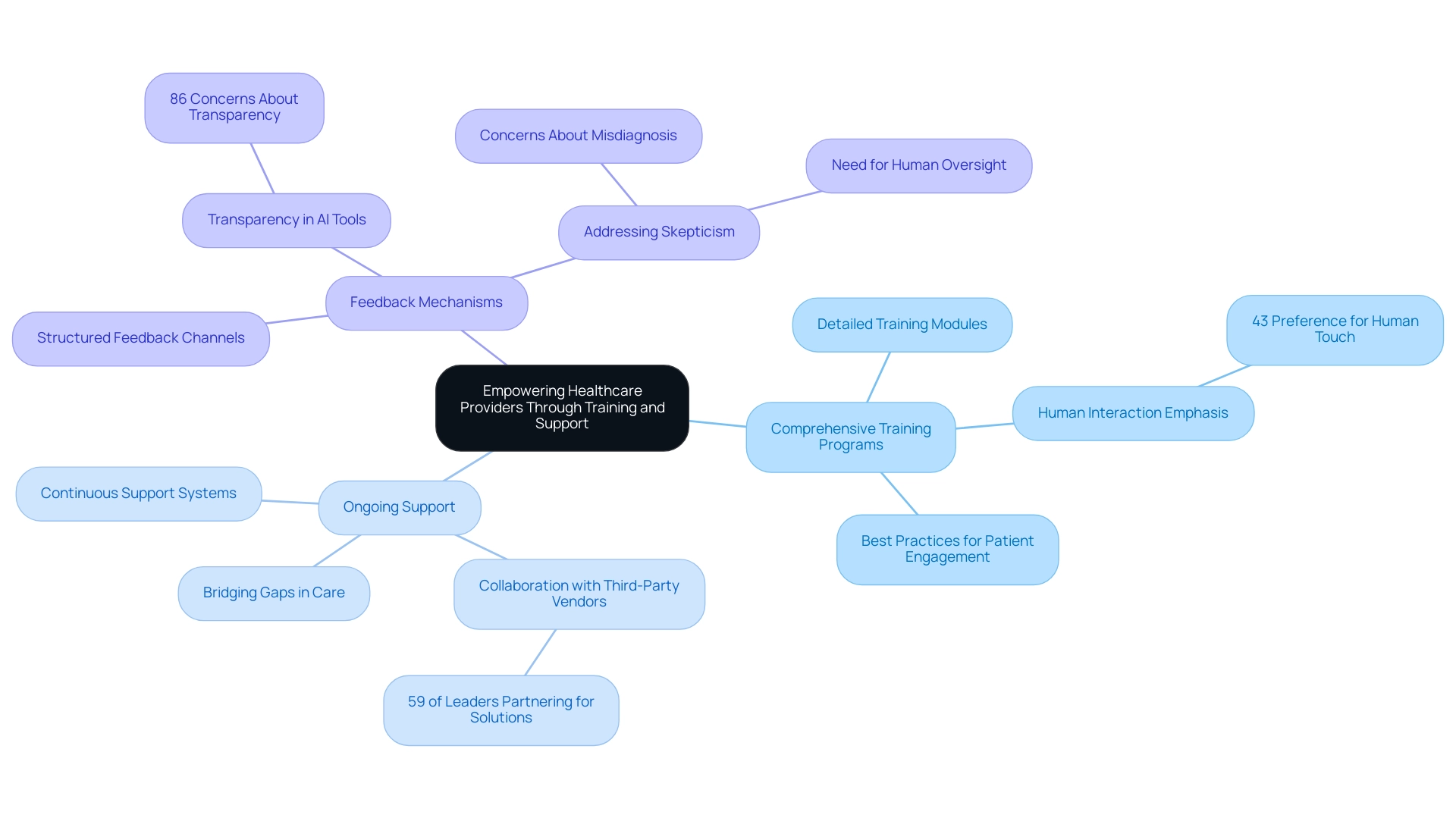
Benefits of AI Integration: Enhancing Patient Care and Operational Efficiency
Integrating AI into healthcare practices presents a multitude of advantages that significantly enhance both patient care and operational efficiency, particularly in overcoming the resistance to innovation often encountered by startups like CosmaNeura.
- Improved Patient Outcomes: AI technologies are revolutionizing diagnostic processes and treatment recommendations, leading to enhanced accuracy and patient satisfaction. Have you ever wondered how technology can improve the care you provide? Research suggests that medical professionals employing AI have observed a significant rise in successful outcomes for individuals, with many experiencing quicker recovery periods and more tailored treatment plans. However, it is essential to address the concerns of medical providers who may be hesitant to embrace these technologies due to fears of jeopardizing quality of service. According to industry forecasts, the clinic AI sector in medicine is anticipated to surpass $10 billion by 2025, highlighting the increasing acknowledgment of AI's influence on individual treatment. For example, a case study from a medical startup demonstrated that implementing AI-driven diagnostics reduced misdiagnosis rates by 25%, showcasing the technology's potential to improve service quality.
- Enhanced Efficiency: By automating routine administrative tasks, AI enables healthcare professionals to devote more time to direct care. This shift not only alleviates professional burnout but also fosters greater job satisfaction, as clinicians can engage more deeply with their patients. Have you felt the weight of administrative burdens? Reports indicate that healthcare professionals can reclaim several hours each day, allowing them to focus on what truly matters—patient health and wellbeing. As Team Leader Dnyaneshwar notes, "AI solutions are essential for streamlining operations and enhancing the quality of service we provide," which can help alleviate doctors' concerns regarding the integration of new technologies. A case study involving a clinic AI that adopted AI for scheduling revealed a 40% reduction in appointment no-shows, further illustrating the operational benefits.
- Cost Savings: AI optimizes resource allocation and minimizes operational costs by streamlining workflows and reducing errors. For instance, practices that have integrated AI solutions have seen a significant decrease in overhead costs, with some reporting savings of up to 30% in administrative expenses. This financial efficiency allows providers to allocate more resources toward care and innovative treatments. A case study highlighted how a medical organization leveraging AI for billing processes improved its revenue cycle management, resulting in a 20% increase in collections. This addresses the financial concerns that clinic AI could help alleviate to prevent hindering innovation.
- Enhanced Individual Engagement: AI tools facilitate personalized communication strategies that improve adherence to treatment plans. By utilizing predictive analytics, medical professionals can customize their interactions, ensuring that individuals receive timely reminders and assistance, which ultimately results in improved health outcomes. Cosmonaut's dedication to Catholic teachings guarantees that are not only efficient but also ethically aligned with the principles of compassionate support, addressing the moral concerns that medical professionals may have regarding the use of AI. A case study from a medical startup demonstrated that personalized AI communication increased adherence to treatment plans by 30%, reinforcing the significance of ethical considerations in AI applications.
These advantages emphasize the transformative potential of clinic AI in medical services. As providers, investing in these technologies is crucial to enhance your practice and deliver exceptional support while addressing the challenges of resistance to innovation. How can you take the next step in integrating AI into your practice?
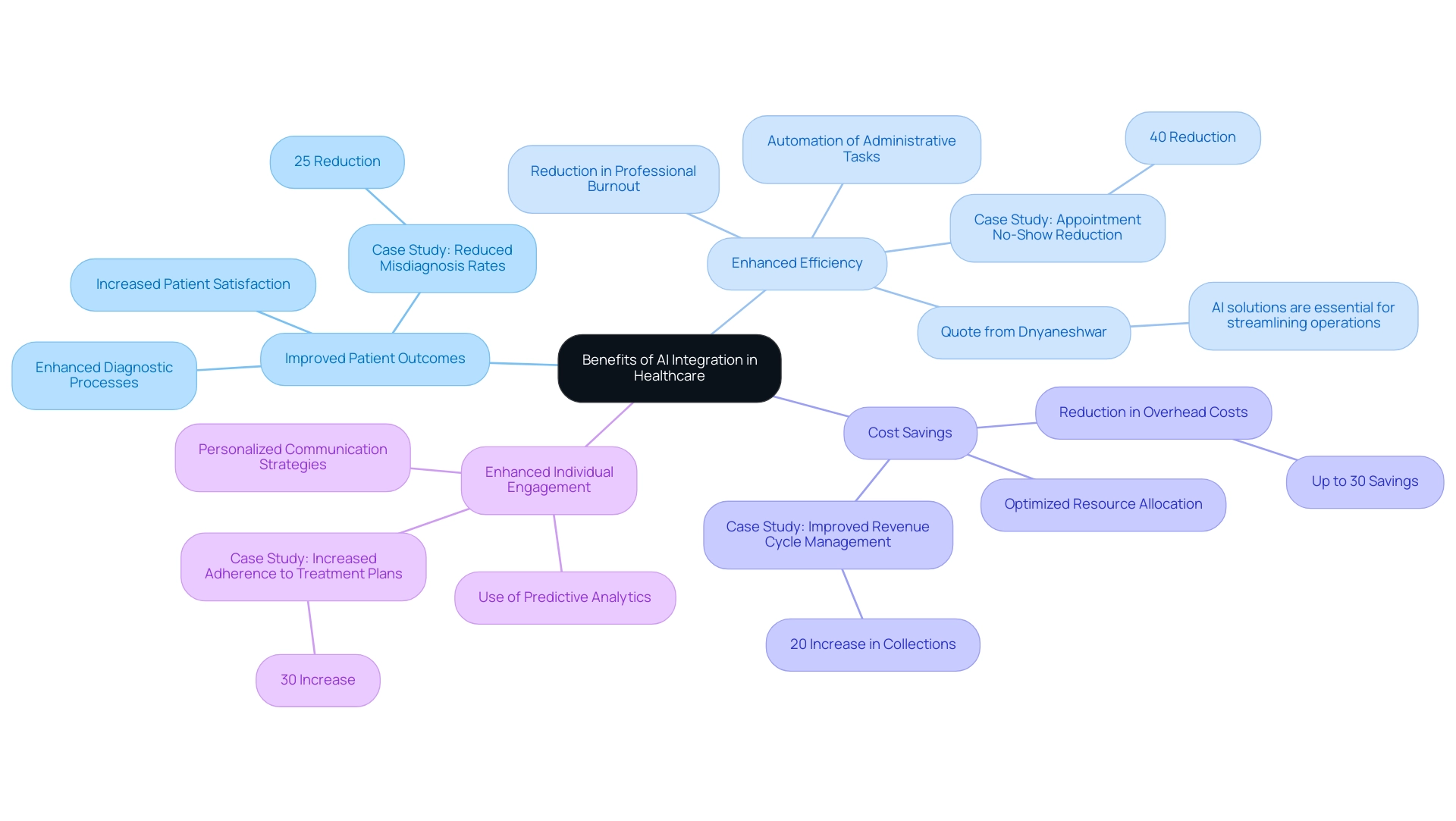
The Future of AI in Healthcare: Trends and Innovations
The future of AI in healthcare promises to bring about remarkable advancements, driven by several pivotal trends that resonate deeply with the emotional challenges faced by healthcare providers:
- Personalized Medicine: AI is transforming treatment plans by harnessing individual patient data, leading to enhanced outcomes and increased patient satisfaction. This shift towards personalized support is expected to become a cornerstone of medical strategies by 2025, offering hope for a more tailored approach to care.
- Predictive Analytics: The integration of AI in predictive analytics allows medical providers to anticipate individual needs more accurately, optimizing resource distribution and enhancing overall service delivery. With 94% of medical organizations already utilizing some form of AI, the momentum for predictive capabilities is undeniable. Notably, a quarter of US hospitals are currently employing AI-driven predictive analytics, showcasing the tangible impact these technologies can have on patient experiences.
- Integration with Wearable Technology: The synergy between AI and wearable devices is set to expand, facilitating real-time health monitoring and proactive management of care. This integration not only enhances individual involvement but also equips medical professionals with essential data to guide their decisions, fostering a supportive environment for patient health.
- Enhanced Decision Support: AI's role in clinical decision support is evolving, offering healthcare professionals comprehensive data analysis to inform their choices. As AI technologies advance, they will increasingly assist in diagnosing conditions and recommending treatment options, thereby improving clinical outcomes. Dr. Margaret Lozovatsky, Vice President of at the AMA, emphasizes that "these newer tools will help us take what exists today, rework it in a way that we now understand the importance of workflow integration."
By staying attuned to these trends, medical professionals can strategically leverage clinic AI technologies to enhance patient care and increase operational efficiency, positioning themselves at the forefront of the evolving medical landscape. Furthermore, the anticipated influence of digital tools and virtual health on health system strategies in 2025 underscores the urgency for providers to adapt. Collaborations, such as those led by Särkkä-Hietala with public sector health organizations, are paving the way for innovative services and systems that will shape the future of healthcare.
In light of these developments, how can you embrace these technologies to alleviate administrative burdens and improve patient experiences? The path forward is not just about technology; it’s about nurturing a compassionate approach to care that prioritizes the needs of both patients and providers.
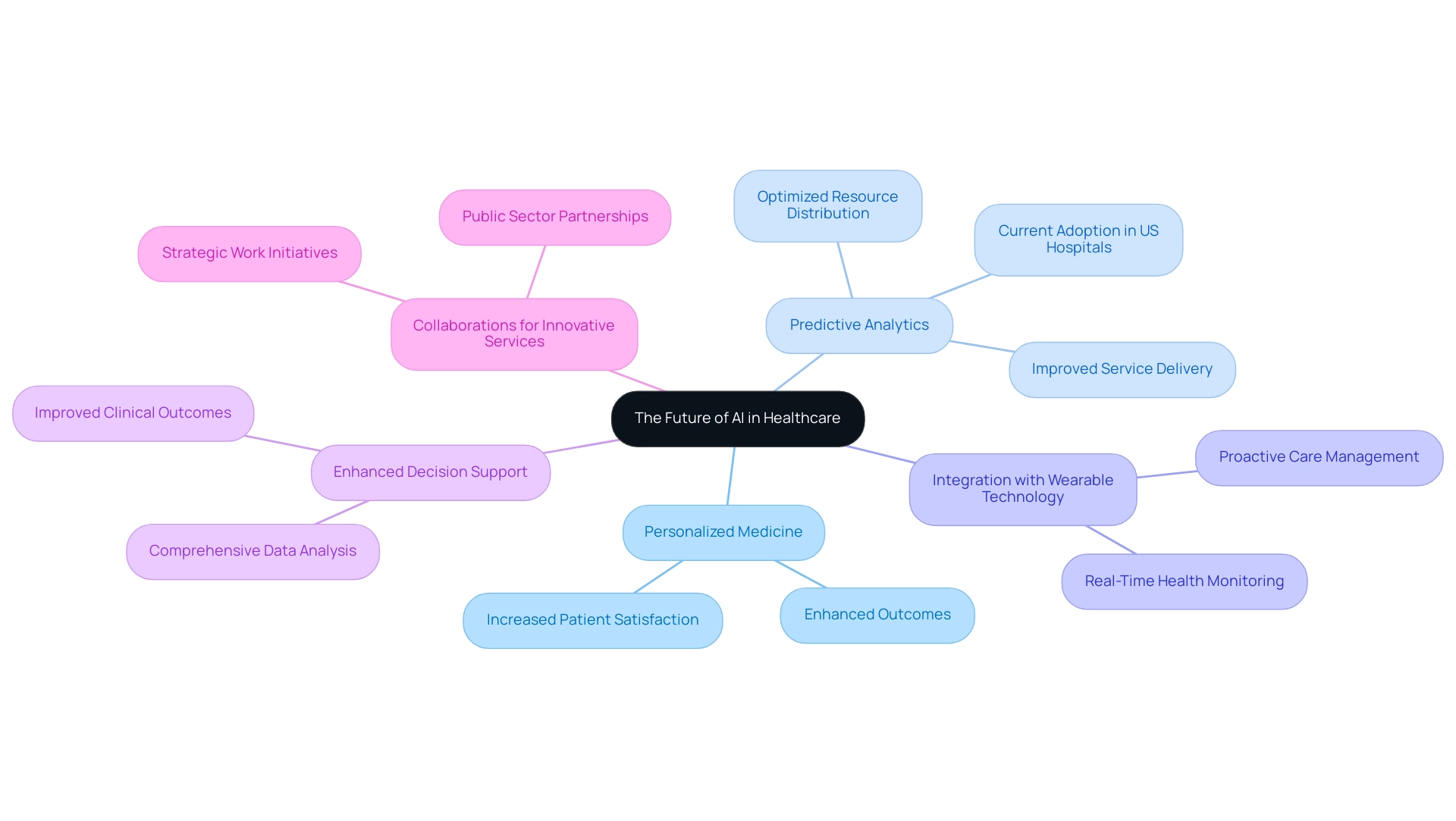
Conclusion
The integration of Artificial Intelligence (AI) in healthcare offers a transformative opportunity that not only enhances patient care but also boosts operational efficiency. By automating routine tasks and improving diagnostic accuracy, AI allows healthcare providers to focus on what truly matters—delivering compassionate care. Numerous studies and case examples demonstrate that AI alleviates administrative burdens, fostering better patient outcomes and satisfaction.
Yet, the journey toward successful AI integration is not without its challenges. Healthcare providers often face concerns regarding the quality of care, data management, and clinician burnout. How can organizations effectively navigate these issues? By engaging stakeholders, implementing pilot programs, and providing robust training and support, healthcare organizations can address these challenges while building trust within their teams. Moreover, aligning AI solutions with ethical and faith-based values ensures that the human touch in patient care remains a priority.
Looking forward, the future of AI in healthcare is set for remarkable advancements. Trends toward personalized medicine, predictive analytics, and enhanced decision support will further solidify AI's role as a vital tool in modern healthcare. As organizations embrace these innovations, they will not only improve operational efficiencies but also uphold the dignity of every patient, ensuring that compassionate care is at the forefront of their mission. Embracing AI is not merely a technological shift; it is a crucial step toward enhancing the quality of care in our evolving healthcare landscape.




